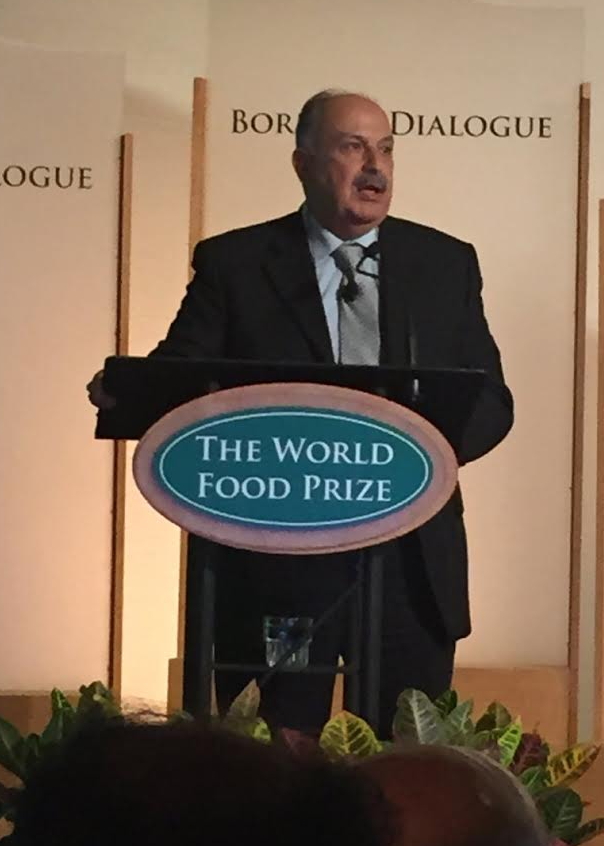The 30th anniversary of the Borlaug Dialogue opened up with a series of gripping presentations exploring food security in times of crisis. Ambassador Kenneth Quinn of the World Food Prize Foundation remarked that “there are emerging vulnerabilities” to global progress that have seen hunger levels steadily drop (as a percentage of the global population) since the mid 20th-century.
A panel of former US Ambassadors in the Middle East shared their views in the opening panel session. Ambassador William Burns, who is now President of the Carnegie Endowment for International Peace, acknowledged the “genuine heroism and creativity” that has led to enormous advances in agriculture, but warned that the increases in people living in fragile states will make it harder for them to feed themselves, or even receive humanitarian food aid. For instance, the United Nations has estimated that around 90 per cent of the Syrian population is in need of food assistance due to the on-going civil war. Ambassador Wendy J. Chamberlin added to this, noting how “food can be used as a weapon” in conflict situations – by preventing urban populations from accessing food or making it unviable to grow crops.
These challenges add a new dimension to other climate-related pressures facing the agricultural sector, from droughts and floods to heatwaves and unpredictable rainfall. Rod Schoonover, Director of Environment and Natural Resources at the National Intelligence Council (NIC), argued that “food security is national security”, citing the devastating effects that natural disasters (such as the floods in Pakistan or the drought in southern Africa) or food riots (such as in Mozambique, Venezuela, India and South Africa) can have. He also showcased a series of unclassified research that the NIC has conducted (all available here) on diverse topics from water security and climate change to agricultural technologies and global health trends.
 Speaking first-hand about the impacts of conflict on food security, Dr Mahmoud Solh who heads up the International Center for Agricultural research in Dry areas (ICARDA), discussed how his research programme and seed vault, which had previously been based near Aleppo, Syria, had to be relocated as a result of the civil war that erupted. In a testament to their resilience and dedication, the team relocated their headquarters to Jordan and successfully duplicated the majority of their unique seed genetic resources and had them shipped to a back-up seed vault in Svalbard Norway. As Syria’s conflict has intensified (and their Aleppo collection became more difficult to access), ICARDA has tapped into the back-up collection in Norway in order to equip crop breeders with the raw materials they need for their research.
Speaking first-hand about the impacts of conflict on food security, Dr Mahmoud Solh who heads up the International Center for Agricultural research in Dry areas (ICARDA), discussed how his research programme and seed vault, which had previously been based near Aleppo, Syria, had to be relocated as a result of the civil war that erupted. In a testament to their resilience and dedication, the team relocated their headquarters to Jordan and successfully duplicated the majority of their unique seed genetic resources and had them shipped to a back-up seed vault in Svalbard Norway. As Syria’s conflict has intensified (and their Aleppo collection became more difficult to access), ICARDA has tapped into the back-up collection in Norway in order to equip crop breeders with the raw materials they need for their research.
The Borlaug Dialogues continue through the rest of the week, with 30 panel sessions and 30 side events scheduled in celebration of the anniversary year.



